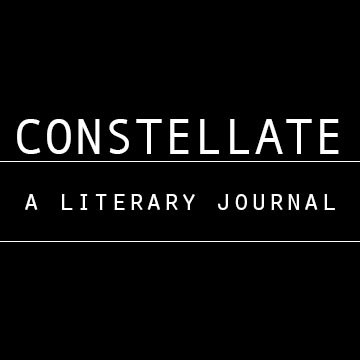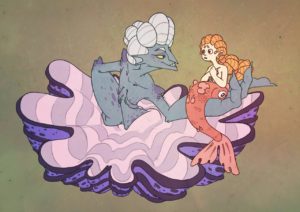I was sitting on the front step watching the day end, a mug of tea at my side, thinking of the last time I’d seen my Dad alive. A hired skip sat at the kerb, its jagged contents rising over the lip. Me and Neil had spent the day clearing out Dad’s old house. I’d expected less of the house to have been disposable. I’d expected less ugliness and brokenness. The contents of the skip looked like debris hauled out of a shipwreck. My attention honed in on a corner of a rug. It was lolling over the metal edge. The rug had had a dense, grey smell, and a haze of sour, pale dust had risen from it when Neil had thrown it into the skip: it had made me think of winter breath.
The last time I’d seen him it had been winter, our breath hanging in the air as we walked the dog together over the playing fields, the ground cold and compacted under our feet. I could remember the high voices of small boys playing football behind us, black birds in the trees like dark buds. I could remember these details but I couldn’t remember what we’d talked about, or what I’d said before catching my train home.
‘Jesus, Ryan. Your old man must have never hoovered in his life, lazy bastard,’ Neil had said, watching the motes turn in the air, dusting off his hands. ‘No offence,’ he’d added. The house was structurally sound and neat enough, but it was full of the signs of a lonely man’s self neglect. On close inspection, the paintwork was stained with nicotine, particularly the ceilings, where the stains grimed the cornices. I had felt shame, watching Neil – a domestically proud man – standing in the sparse kitchen, frowning into cupboards as the kettle boiled. It was possible, I realised, to inherit the embarrassment of private details (like the sticky brown stains from mouldy condiment jars, or dead flies on a window sill) being exposed and held to the light. Now, sitting out in the dusk with the drone of plane engines far above me, I wanted to smoke, but the yellow thought of those ceiling stains made me feel ill. I looked at my watch. Twenty minutes had passed already since Neil had left and the mug of tea was cold on the step. I just sat with my hands on my knees watching the street and not knowing what to do.
A car turned the corner and pulled to a stop just opposite. I watched as a little boy stepped out of the car and skipped down a front pathway to a glossy green door. My new neighbours. I could hardly imagine that energy, wanting to run home like that: it made my head reel. The little boy was dancing about on the step ringing the doorbell before his Mum had even got out of the car. When a man came to answer the door to his young son, lifting him up with cartoon strain, I looked away.
The time me and Dad had walked the dog together had been long ago: enough years to have lost track exactly. The news of his death hadn’t much shocked me. In a small way I’d even felt unburdened of something. One thing I couldn’t quite get my head around was this physical legacy that had been left behind in the world, the sudden transferral of ownership. How was it right that suddenly, without any doing, I’d become the owner of this terraced house on this quiet, unfamiliar street? How was it right that this cracked front path and black metal gate and tangled lawn was not his any more, but mine? Perhaps it would have made more sense to me if I’d still been with Marie, or Rona, if either of them had been helping me clear out the place instead of Neil. Perhaps then, I could have started to imagine that I could have lived here and made a home, put down roots. Or perhaps it would have made more sense if I’d had memories tied to the place, good or bad, a feeling of being connected to this part of the world and this street and this building, but Dad had moved here just before we’d slipped out of touch. I had only visited once or twice. I’d remembered the house larger and cleaner. The front lawn had been kept mown and neat with the flower beds clearly demarcated at the bottom, not clotted with dead brown weeds as they were now.
‘You’ll feel glad to have something solid, an asset like this to your name,’ Neil had said, just before leaving. ‘It’ll be worth a fair bit of money I bet. Nice old Victorian house like that, big garden to the back, decent part of town, three bedrooms for a family. I’ll bet the agent will say it’s worth a fair bit.’
‘Oh yeah,’ I’d said. ‘And it’ll look good once it’s done up a bit. It was just the furnishings need stripping out, nothing wrong with the house itself.’
‘Nothing wrong at all.’
Neil was right, on that point. I should have felt glad about the security at the least. For a few months I’d been out of work. Two weeks before, I had bought a travelling yurt on ebay. I don’t know why. I was going to pay for it on credit and was halfway through messaging the seller about picking it up when Mum had called with the news about Dad’s heart attack. At the end of the conversation we had been saying our goodbyes over each other and it had felt awkward and unfinished. When I put the phone down, I was left with this sharp-edged feeling. I’d wanted to call her back and tell her about the travelling yurt I’d just bought, just to have something else to say.
A long time ago it had suited me to be rootless. I trained to be a professional storyteller and moved around all over Scotland. I had done ok out of it, relatively speaking, enough to get by between stints of better paid construction jobs. I went round primary schools and travelled with mobile libraries to remote highland villages. In the summertimes I did the festival circuit: outdoor ceilidhs, fire festivals, all of the tourist and hippie shit. I’d had a girlfriend from Aberdeen: Rona. She was beautiful and plump with brown hair and freckled skin. I’d loved her creamy belly and pale thighs, the wealth of her flesh in my hands. I used to lie next to her in our flat on the Moray coast, half asleep, while the cold sea whispered at us through the gaps in the windows, and I’d think about characters from the bank of folk stories in my head, like the one about Nasruddin in the Turkish baths. This was something I’d been taught to do in the drama classes: a way of helping me remember. In those years, memories of my own early life became more and more pallid, as though by natural displacement. Sometimes me and Rona would go on walks, taking shrooms in the hills and lying together watching patterns appear in the sky. There would be all kinds of patterns: a slow moving, fractal geometry of subtle colours; white feathery threads or blue wallpaper patterns with flecks of red light in softly melting circles, turning above us and forming anew, blossoming over and over again. There was something alive in that idea of fractal geometry, in the ceaselessness and expanse of it. It was something unreachable and impossible to describe, like the memory of a dream. It suited my placelessness, back then.
‘What would you say to your Dad, then, if you ever saw him again?’ Rona had said on one of these trips, when we were looking down at the winter light on the waters of Loch-a-Choire. ‘If he was here now, what would you say?’
‘I’d tell him,’ I’d said. ‘I’d tell him…..’ But I hadn’t been able to finish the sentence. Back then I couldn’t form a single thought about him that felt right. The words to explain what was missing or wrong just didn’t ever form in me, it was as though they existed only in a foreign language. Perhaps one day I’d be able to answer that question, though I don’t know who would ask it again, and what the use would be in having an answer now. I picked up the cold tea and stood up. My knees were sore. I thought about the compactable yurt and felt ridiculous. Those years of taking pleasure in moving around were gone. I had already messaged the seller to delay picking it up. I decided then that I would drive to pick up the yurt tomorrow and then just list it for sale again, be rid of it.
‘How does it feel to be a homeowner?’ Neil had said. ‘Not a renter anymore.’
‘Not sure I know what it means, yet,’ I’d said. It was a strange word, that: homeowner. ‘When I’ve found a place of my own maybe I’ll know.’
‘Yeah,’ he said. ‘We’re all just passing through anyway, aren’t we? It’s just an illusion, holding those keys in your hand, but it’s a nice one. You’re lucky.’
‘Thanks,’ I’d said.
Maybe he was right: it could be ok. I’d look for a new place, a new job, a new start. I’d do it up, invite people over. They’d tell me how nice the house looked. I could get a dog, play with it in the garden, jog round the local park, walk to the corner shop to buy milk and the paper early in the mornings. And maybe some day I’d be sitting at the kitchen table and rolling a cigarette with a cup of coffee next to me and the sunlight would slant on the wood a certain way, and then the phone would ring – someone who loved me, maybe – and I’d think, yeah, this is alright. So I thought about all of that, turning it over, how the light might look, as I went inside and poured the rest of the tea down the sink.
© Lisa Phillips
Lisa Phillips is a graduate of the Creative Writing programme at UEA, and the Masters programme
at the University of Manchester’s Centre for New Writing. She was awarded a literary prize by
the Mulcahy Conway literary agency for her Masters dissertation, and the first chapter of
her novel in progress was recently published in the ‘Pulp Idol’ 2018 anthology. She lives in
Manchester.
Lisa is contactable at lisaphillips195@gmail.com


